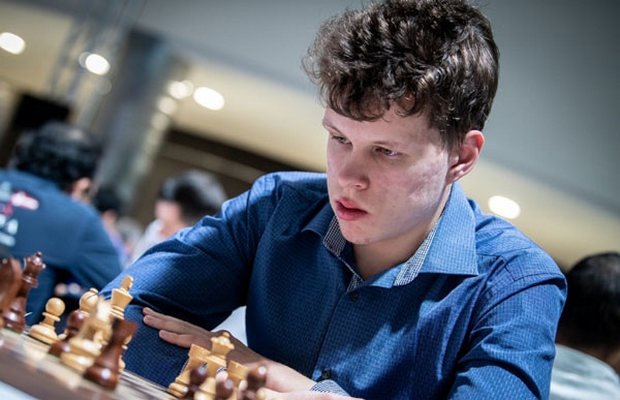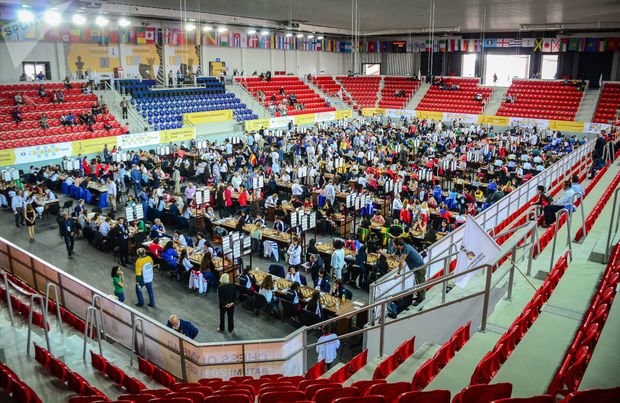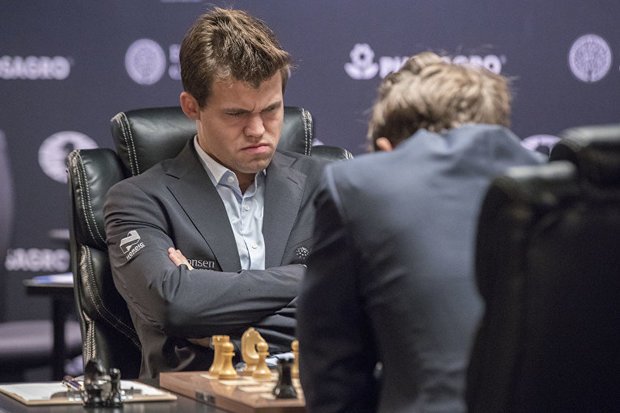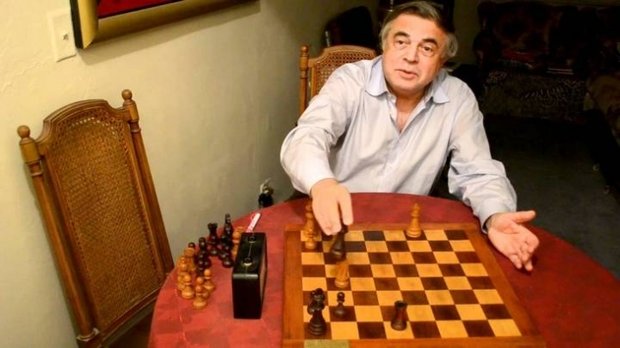Ildar Ibragimov: ''Artemyev has room for improvement. He has huge potential''
Kazan has seen the first world chess champion in its history
The World Team Chess Championship ended in Astana. The Russian men's team won a landslide victory there scoring 16 points and going ahead of the silver medallist – England – by three points. 21-year-old Kazan grandmaster Vladislav Artemyev who scored 6,5/8 points became a real leader of the team and the tournament's discovery. He will be participating in the Russian Team Chess Championships this spring together Ladya team from Kazan. Captain of Ladya and Executive Director of the republic's chess federation Ildar Ibragimov shared the details of the world championship, characterised Artemyev's performance and other things with Realnoe Vremya.
''In opening theory, Artemyev resembles Carlsen''
Mr Ibragimov, we congratulate the Kazan chess team on the first world champion in its history. Though the day when we arranged this interview, I was confident of your victory beforehand, while you evaluated the current situation with the Swedish literally ''everything is complicated''.
So was it. When you called me, Sergey Karjakin already saw a draw looming on the first board after the opening, Aleksandr Grischuk played for three outcomes: he sacrificed a pawn, a serious situation was created, which could have brought to anything – a victory, a draw, a defeat. At one point, Dmitry Andreykin had a dangerous situation when he passed by a strong move and won the pawn. It seemed it was time for Andreykin to think of saving or forcing a draw. Vladislav's position was more pleasant, but nothing special. In the end, the score seemed to be 2,5:1,5 in favour of Sweden at that moment.
As an unprofessional chess player, I was convinced you would win because of knowledge of the sport when the level makes itself known in the end. ''Everything is complicated'' is a usual situation for a meeting between an outsider and a favourite when both have some chances, but a stronger and skilled rival uses them.
The victory of the team Russia over Sweden seemed obvious to everyone, without doubt. But sport is interesting because a sensation is created at times, which this world championship had (Editor's Note: the victory of Sweden over Azerbaijan, a draw between Egypt and China). If we had stumbled over Sweden, we would have been upset and faced India, and everyone would have been nervous. But it turned out simply amazing.
Moreover, when Artemyev was going to play, we had a positive result looming. He played eight matches, scored 6,5 points (Editor's Note: and became the best among tournament participants) and, what is important, provided with decisive points. The other chessboards had three draws while Vladislav won and provided the team with the all-around victory. So was it with Iran, on Vladislav's birthday, so was it in the match against the team USA.

''When Artemyev was going to play, we had a positive result. He played eight matches, scored 6,5 points and, what is important, provided with decisive points.'' Photo: rt-online.ru
President of the Russian chess federation Andrey Filatov had said before the championship began: ''Artemyev is one of the key hopes of Russian chess. Vladislav's progress is obvious. The latest victory at a very strong festival in Gibraltar impresses. He can become a discovery of the national team.'' And here is his comment on the results of the WC: ''Our debutant Artemyev made an especially big contribution to the success whose phenomenal game mainly favoured this result.'' What do you think we should attribute Vladislav's such progress to?
Mastery grows thanks to gained experienced. He works hard. We should note that he is mentally resilient, everything is good in his personal life, he married Kazan chess player Olga Belova last year, this year the family is expecting a child. It's the moment when everything is great in his life, God willing, might this go on. He has room for improvement, in the same opening theory, to study it. But some advantage hides here as well. For instance, Magnus Carlsen isn't good at theories either, this is why he avoids complications and deep analysis, he just stays clear of the theory during the game and achieves the final advantage in nuances and wins the opponent in simple positions. Vladislav plays in a similar way, especially with white pawns. But he often uses homemade developments when playing with the black ones.
In a word, there is room for improvement, as Artemyev has huge potential.
''Karjakin performed below his capacity''
Four members of the team Russia – old hands Karjakin and Grischuk, younger Nepomnyaschy and Andreykin – were the skeleton of the team. Had Vladislav already been in the team? I had an impression that he was invited to the team at the last moment, almost immediately after his victory in Gibraltar.
It seems to me that precisely the victory in Gibraltar was the decisive factor. It was very honourable to win the tournament with the world top 20 grandmasters. As I've already compared Vladislav with Carlsen, here I will say how Vladimir Kramnik joined the national team. When he was included to the Olympic squad in 1992, he was just 17. Who was he in comparison with mastodons of the Soviet chess school? Nevertheless, Garry Kasparov wanted to invite him, and Kramnik simply tore the opponents apart on his board – 8,5/9.
Then Kasparov himself won 8,5/10 on the first board. Now our leader Sergey Karjakin scored 3 of 7. And what especially seemed insulting that in a match against Azerbaijan he lost to Arkady Naidich when we already held the lead and a draw was needed from him for the all-round victory. What happened to the ''defence minister''?
It's a special thing to play on the first board. The result suggests that Karjakin performed below his capacity. But to answer the question ''Why?'', we need to analyse almost all his games in the tournament, and I haven't seen them all. But he played while some teams' leaders didn't go to Astana at all, like Shakhriyar Mamedyarov from Azerbaijan, a number of leaders of the team USA.

''We should keep in mind that the USA traditionally bets on the Olympics like a team event, putting world championships a bit lower. As it was the regulation's will, an African representative played here – Egypt. Kazakhstan participated as a host, the team Sweden was invited because some teams refused, thus reducing the competition level.'' Photo: sputnik-georgia.ru
My next question is about it. The team USA at the last Olympics is a beauty and pride of the American chess school: Caruana, Nakamura, Robson, So, Shankland. The team USA at the world championship, including its female team, is a team of ''migrant workers''. It reminded me of the 90s and the 2000s when only pupils of the Soviet school performed for the American team, became Olympic medallists in this team, including you, Gata Kamsky.
And Aleksandr Onischuk who has played in the national team now. But you're judging by last names: Polish Dariusz Świercz, Georgian Zviad Izoria, Alexandr Linderman, who was born in Leningrad, and Armenian Samuel Sevian. But it was not that they were on their way to the USA but were denied access and sent to play for the national team to Astana. Sevian was born there, Linderman moved in early childhood, it's the same product of the American school as Caruana, Nakamura and so on. Onischuk has lived there from time immemorial.
Then we should keep in mind that the USA traditionally bets on the Olympics like a team event, putting world championships a bit lower. As it was the regulation's will, an African representative played here – Egypt. Kazakhstan participated as a host, the team Sweden was invited because some teams refused, thus reducing the competition level. Unlike the Olympics, some of the strongest teams didn't come, same Armenia, Israel, Ukraine, France. Poland refused at the last moment. This explains the situation in general.
Particularly it wasn't clear for long where the world championship would be, when. It was on the 2019 competition calendar, but without specifics. As I understand, after Arkady Dvorkovich was chosen as new FIDE president, it became possible to hold talks fast, detect interest to hold the tournament in Kazakhstan. But not all strongest world chess players were ready to change their schedules. For instance, somebody already had a strong tournament in Saint Lucia that Zsuzsa Polgár holds at the same time in the calendar.
''Iran that's entering the elite in leaps and bounds''
Does the championship hosted in Astana open a new point on the world map, that's to say, Kazakhstan? They didn't have very strong chess players previously. From the Soviet era, we can remember Vaisser, Vladimirov, Avrukh, Tkachyov who moved to France, finally Darmen Sadvakasov who has become a member of government and demonstrates the country's desire to develop this sport.
I wouldn't agree on Avrukh. Like Linderman who has been mentioned, he was born in Kazakhstan, moved to Israel with his parents and established as a chess player there. Sadvakasov, yes. And we should note representatives of the women's team, they have young, very promising girls. It's a result of state support of chess, great attention paid to schools.
In this respect, I would also mention Iran that's entering the elite in leaps and bounds. Alireza Firouzja performed well, the victory of Artemyev over him provided us with the all-round victory over Iran. They have a young man Parham Maghsoodloo who won the world junior championship with a score 9,5/10. Only their athlete Sarasadat Khademalsharieh became a medallist at the recent world blitz and rapid championship in both events.
If we remember those two world championships on New Year's eve, Artemyev almost became a medallist.
Vladislav entered the world chess elite in both blitz and rapid events having won the European blitz chess championship last year and became fourth in the world in rapid. And he didn't get a bronze only because of additional indicators.
Carlsen predictably became a world blitz champion, in rapid, he performed like Santa Claus losing to chess players who will remember a victory over him for the rest of their lives.
It's already becoming tactics or not, but Carlsen's sports path in matches with a time control. He began the world championship in Saudi Arabia one year earlier in the same way. But I wouldn't say the level of those who won him in Petersburg is low. Zubov from Ukraine is a very good chess player as well as Tukhayev from Crimea.

''Magnus Carlsen isn't strong in theories either, this is why he avoids complications and deep analysis, he just stays clear of the theory during the game and achieves the final advantage in nuances and wins the opponent in simple positions.'' Photo: AP Photo, Mary Altaffer (inosmi.ru)
I've been impressed now by an interview of Lev Alburt, one of the few athletes who escaped the USSR. The arrant anti-Soviet person says about America: ''The dislike for Russia is being so extreme now! Not among the masses but in the elite, moreover, both on the left and the right, among Democrats and Republicans. There was no such thing in the Soviet era! Even when the Soviet Union sent in troops to Afghanistan. Now a journalist is writing a good piece about Russia or Putin, which is hard to challenge, for instance, 'Russia has a lot of great chess players'. So what? The magazine's editor-in-chief will probably cross it out. This is all true, but what will readers think? How come? We? Saying good things about Russia!?'' Is he right?
It's true. An anti-Russian public opinion is actively created now, which I don't know how to fight. To invite them here, the same Crimea so that they will make sure they don't have occupation forces, everything was fine with human rights. But they are stubborn, they don't need to change their opinion about Russia that is imposed on ordinary Americans. And the latest events made Alburt now rather support Russia and Vladimir Putin's politics.

''The latest events made Alburt now rather support Russia and Vladimir Putin's politics.'' Photo: chess-news.ru
As for emigrants of my generation who left the country without any obstacle, they have quite a good attitude to Russia and don't remember life in the USSR badly as time goes by. Moreover, all chess players who wanted repatriation to Israel went. Perhaps it was harder to do it at some point, but this was easy when the USSR was about to dissolve. And everyone went – Jews, people married Jewish women found to have some per cent of Jewish blood.
In my opinion, the majority of chess players left the Union not for political reasons but a desire to calmly go to foreign tournaments. Even Viktor Korchnoy who didn't go but simply stayed in the West explained his desire this way – to play, to play and to play.